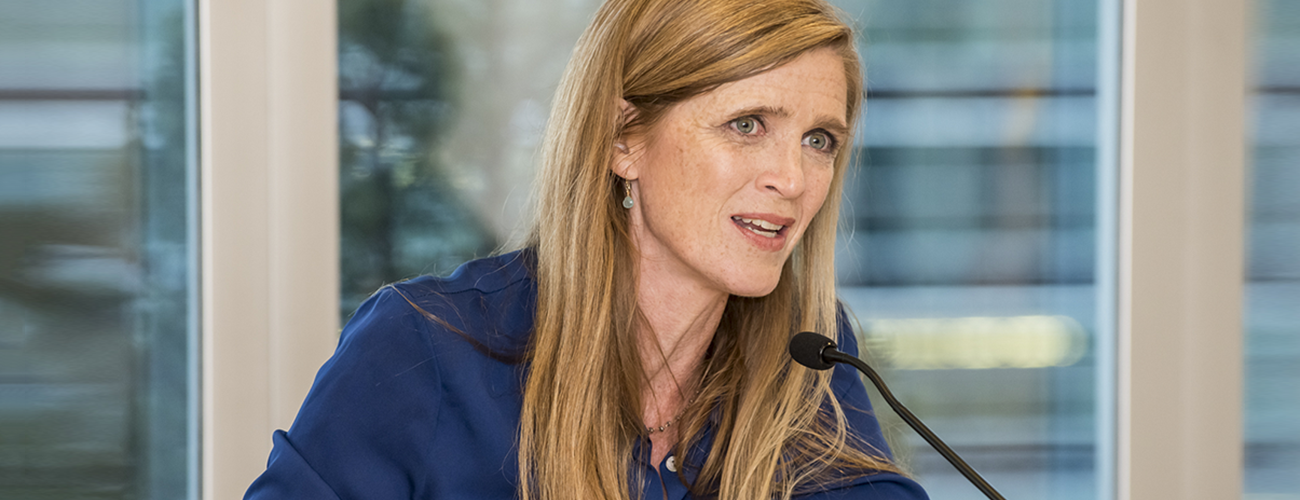In her new memoir, The Education of an Idealist, former American ambassador to the United Nations Samantha Power says the question she heard most frequently during her three and a half years in the post was “what can one person do?”
In a September 11th Distinguished Author Series event at IPI featuring the book, Ms. Power posited a response to that question. “Shrink the change,” she said. “Even when you can’t come up with a big solution, there may well be something, however modest, you can do. Throughout history, the big solutions usually come through incremental change.”
She acknowledged that when confronting problems that seem too daunting to be solved, “small measures… can seem like a cop out.” But she asserted, “If you think about what is in the reach of our individual power to address, I think it’s actually a very useful frame. If you add up all those small steps that can be taken, that’s where you start to make real inroads.”
The observation was a sobering one coming from Ms. Power, a bold and vocal rights advocate in the years before she went into government as President Obama’s human rights adviser and then as UN ambassador. The Education of an Idealist is a book about whether an activist outsider can become a pragmatic insider without compromising her motivating ideals.
It is an unusually personal narrative for a foreign policy book, with Ms. Power detailing the uprooting of her family life in the passage to America from Ireland when she was nine, her lifelong guilt over a cherished hard-drinking father who was left behind in Dublin and died young, her interactions for years with counsellors and therapists to overcome debilitating anxiety attacks, her reliance in the male-dominated National Security world upon a support group of fellow professional women called the Wednesday Group, and her efforts to balance the simultaneous responsibilities to nation and to two young children.
She said her aspiration in “telling a very personal story is to try to break through and tell a story that people can relate to irrespective of whether they’ve ever worked in the halls of power or ever negotiated at the UN.”
In answer to questions, she deplored the Trump Administration’s decision to exit the Iran nuclear agreement, pointing out that it was “international law” since it had been approved by the UN Security Council and was an accord “that all independent verifiers had judged to have been complied with.” She said the effect of the US walking away from the deal was “uniting the rest of the world against the Trump Administration’s policy.”
On the Obama Administration’s much criticized inaction on Syria’s chemical weapons attacks on its own people in 2013, she conceded that the US “utterly failed” both to produce a negotiated solution and to reach people in enclaves that were surrounded by Syrian regime troops. But she noted that the US, working with Jordan, Australia, Luxembourg, The United Kingdom, France and Russia, was able to bring assistance to people in the opposition-held northern part of the country. “A pittance compared to what was necessary,” she said, “but preferable to the lamentation that you were tempted to end up in, you know, where you weren’t able to just say, ‘Is there anything against this bleak backdrop that can be hived off, where there is scope to forge an agreement, any place where there is scope to make inroads?’”
She said that she had made it a point in office to visit every country’s mission at the UN and was told in many of them that she was the first American permanent representative to ever appear there. On those calls, she said, “nothing was more unsettling than my conversations with ambassadors whose countries were threatened with extinction as a result of climate change.”
Asked if the US could recover its lapsed reputation for international leadership, she said, “I think the fastest route to recovery is not only a victory in 2020, but a margin of victory that allows us to make the claim that it isn’t just a changing of the guard, but it is a repudiation of the comprehensive approach which is one that traffics in falsehoods, one that doesn’t see the value of alliances, that doesn’t see the preciousness of our values as a source of strength in the world, whatever our limitations.”
She warned that this recovery could take time, given the conduct of the US in the international sphere over the past three years. “It’s going to sound tinny when we talk to other governments about the importance of respecting a free media, the importance of free assembly, the importance of civilian control of the military, of respecting dissenting viewpoints, the importance of facts and truth and credibility. We will have to redeem these past years.”








